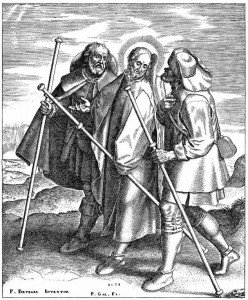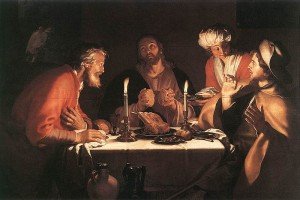The heart is affected in the lectionary readings this week.
Peter proclaims the crucified Christ to all of Israel, and this message cuts to the heart of those listening. The long awaited desire of Israel, the Messiah, the hope of their hearts had been put to death, and they are responsible for it. What could be a more devastating and piercing message? The hope of the ages, the Messiah, has been crucified. They call out, “’Brothers, what should we do?’ Peter said to them, ‘Repent, and be baptized…’”(Act 2:37-38) The message of Jesus Christ’s death cuts to the heart.
We see this on the road to Emmaus the Sunday after Christ death. Cleopas has been cut to the heart his group is discussing what had happened on Friday. A stranger asks about what they are talking about and Cleopas proclaims Jesus Christ’s death, about how he was handed over and condemned to die upon a cross. Cleopas had hoped Jesus would be the one to redeem Israel but was cut to the heart by his death. Women had gone to Jesus’ tomb earlier that morning. It was empty. They said angels told them Jesus was alive. But some of Cleopas’ friends had gone to the tomb and didn’t see anything: no body, no angels, no risen Christ.
Cleopas has been cut to the heart and pours it out to this stranger on their way to Emmaus. He proclaims Jesus’ death, entirely unaware that he is speaking to the risen Christ. Jesus said to him, “‘Oh, how foolish you are, and how slow of heart to believe all that the prophets have declared! Was it not necessary that the Messiah should suffer these things and then enter into his glory?’ Then beginning with Moses and all the prophets, he interpreted to them the things about himself in all the scriptures.” (Luke 24:25-27)
The group pleads with the stranger to stay with them and at the table he, “took bread, blessed and broke it, and gave it to them. Then their eyes were opened, and they recognized him; and he vanished from their sight.” (Luke 24:30-31)
Jesus had opened the Scriptures to them but they did not know or recognize him until he given them the bread. In this reenactment of the Last Supper Jesus Christ makes himself known as the one who was handed over to death. He was taken and broken, like the bread; he was handed over to be condemned to death. But now in a room, perhaps an upper room, the risen Christ gives them the bread that he had broken and blessed. In this he has handed himself over to those gathered, he gives them his body, the bread. The stranger, whose body was broken, is made known in the breaking of the bread. In the Eucharist we receive from the risen Christ his broken body. He handed himself over to us, and we handed him over to death upon a cross. He continues to hand himself over to us making himself know in the breaking of the bread.
Christ is seen for who he truly is then vanishes from their sight and those in the room say to each other, “Were not our hearts burning within us while he was talking to us on the road, while he was opening the scriptures to us?” (Luke 24:32)
We have been cut to the heart and slow of heart. Yet, were not our hearts burning within us?
-In what ways has the message of Christ death cut to your heart?
-How have you been slow of heart?
-How has your heart been burning within as the scriptures have been opened to you this week?



